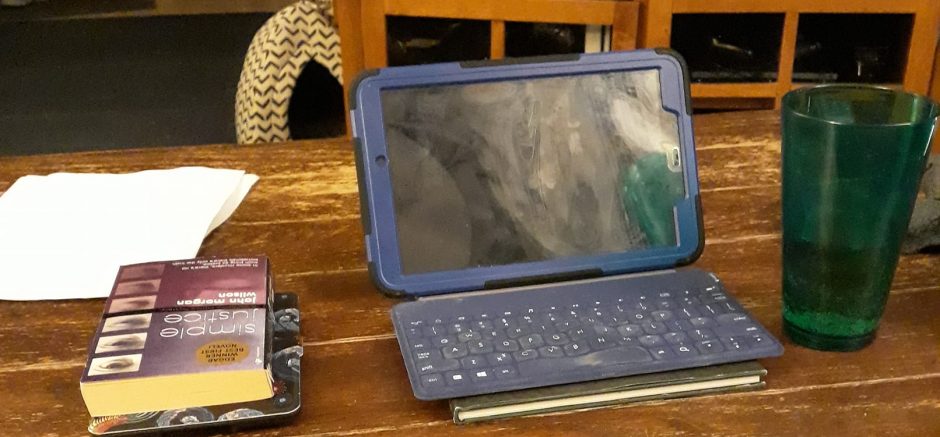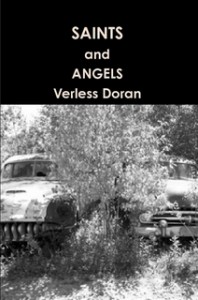Verless Doran lives and writes in the hills of East Tennessee. His works have appeared in The Smoking Poet, Heroin Love Songs, Lit Up Magazine, The Suisun Valley Review, Prick of the Spindle Press, Dogzplot Literary Journal, and Riverbabble Journal. His first collection of short stories, Saints and Angels, is available now online and in select bookstores.
This first question is the easy one: why self-publish?
I know the term “self publish” is a bit of a dirty phrase for some writers, but it has never seemed as such to me. To me it is no different from a painter buying his paints and canvases and then selling them on a street corner, which most artists and writers regard with a kind of Bohemian reverence. “Wow, look at him all poor and hungry,” we say, “selling his art on the street for scraps of bread. He must be a real artist.” A writer friend of mine, whom I shall leave unnamed, who has been “traditionally published” said to me once, “There is nothing more pathetic than a writer selling books out of the trunk of his car.” I believe there is nothing more beautiful. Especially after said writer has put in a full day at work at his regular job. I love to see anyone believe in what they do that much. And that’s all publishing boils down to, getting someone to believe in what you do. And at the end of the day it might be only you that believes in it. Van Gogh was fortunate to have had one other person to believe in him, and that was his brother. Stephen Crane, James Joyce, Mark Twain and many other great writers chose to self-publish because no one else believed in what they were doing. But like them I did not come to the conclusion to self-publish hastily. I went the “traditional” route for 15 years, licking stamps, stuffing envelopes, addressing return envelopes, running down to the post office, collecting rejection letters. I have been published here and there, but I have never earned a living at writing, and I do not expect to earn a living by self-publishing. The important thing to me was to get the work out there. To me, the work was what was important. I think too many writers are consumed by trying to be the next Stephen King or John Grisham and not concerned about getting the work into the hands of readers who can appreciate it.
You and I share an affinity for the work of the late Larry Brown. What do you find in his work that you can't get anywhere else?
There is a rough, edgy truth to his words, that I have seldom found in other writing. And that truth reveals itself to all manner of readers, not just those from the south. People all over the world know what the truth is, and it doesn’t matter into what vernacular you place it. Personally, when I discovered Brown it was a complete revelation to me. I had long tried to be the next Faulkner, Dickey, or Conroy, filling up page after page of beautiful pastoral settings and elaborate heart-wrenching emotions and people would read my work and say, “There is a southern writer.” The first book I read by Brown was “Joe.” And I remember thinking, “Wow, people really write like this? People really just say what they want to say, the way it needs to be said?” I was amazed, and renewed spiritually, because I knew I could write like that. Not necessarily in his style, but from the same place he wrote from. He also taught me that being where you are from is not a thing to be ashamed of, in the real world or the “academic” one.
In the documentary Rough South of Larry Brown, both Brown and his wife admit their marriage and his family life suffered because of his writing. It's unclear if they ever made peace with that before he died. Could you comment on this, as I know you’re a family man as well? How do you keep the balance between writing and family, or whatever takes up most of your time in opposition to writing?
I think in the documentary there never was a real peace between Brown and his wife, perhaps a cease-fire. A 38th parallel drawn in the sand. Both sides came to accept what could and could not be changed. I understand this completely, as anyone does who has a particular passion and a family, especially when said passion is not putting food on the table. I think everyone comes (or should come) to a point in their lives when they learn to prioritize. I decided to have a family, and that for me had to take preeminence. Part of having a family entails providing for that family monetarily, so my job has to come second. I write in what time is left over. I have stayed up many nights, till dawn writing, and then gone on to work that morning, because it was the only time I could find to do it in. I have never been a writer who has had to be “moved” to write. Though I have felt inspiration to write, I don’t have to have inspiration, per se, to write. I have been blessed with a natural tendency to write, not a natural talent, but a tendency. It has just always seemed like a very easy thing to do. So I can arrange my writing schedule around all the other activities going on in my life.
"A Day Without Rain" posits a day in which nothing seems to be going right for its narrator, who has a number of issues working his brain and is not getting very far with them. Yet the story, which ends in lovemaking, outlines just how desperate his/their situation is: they have each other, and they have a momentary break when they can forget reality, and that's it. You can see another day rolling along soon in which nothing much will change. I may be reading too much into this or not enough, but the story kicked me in the teeth. How do you see the story? Uplifting or depressing?
That is one of my favorite stories, and it made my heart glad to write it. I believe it is a very uplifting story. I actually wrote most of it while on the phone with Sharon. We were engaged to be married, but for the time being she was all the way in New York and I was in Tennessee, so most of our courtship was done over the phone. I was trying to write her a story of what I imagined our married life to be like, and this story is what came of it. In this world you only have what you can hold in your hands, and at the end of the day if it ain’t the ones you love, you ain’t got nothing. Each new day is a mystery filled with pitfalls and joys, and you just have to keep holding on to each other through it all.
In the story "Lyrics," two prisoners take their pleasure from one another—hard to call it just fucking—in a bit of hardscrabble romance using song lyrics to complete their individual fantasies. It's unexpectedly tender and carefully written, but again seems hopeful for the characters, whereas the reader knows things aren't going to change. It's a neat bit of story, and I wondered how much you worked on the tone, on how to keep it realistic without being prurient.
Another of my favorites. I’ve always felt a little uncomfortable writing about things of a sexual nature, in explicit terms and such, possibly because I don’t speak that way, and right or wrong, I always write how I speak. But for this story in particular, I didn’t want anyone to get caught up in the act itself, but in the fact that these two men, in this circumstance, were doing whatever they had to do to feel the human touch that they needed. The story itself came from a flash fiction exercise inspired by our mutual friend Heather Fowler. We were to write a story under the theme, and I don’t remember if it was this exactly, but it was something like “Lyrics of Love’s Faded Reminder.” I just got to thinking about how music conjures up so many memories for us, what if I applied that to a situation where memory is everything.
How does your occupation affect what you write?
I come up with so many stories on the job that if I had the money I would hire a stenographer to take down everything so I don’t forget it. Construction work is such a human occupation, it’s all sweat and stories and jokes. I’ll take a piece of a story I heard here, or a thing that I’ve seen there and eventually make a complete story of it. It can also be a very monotonous job, doing the same thing over and over again to where you can let your mind drift, though you have to be careful not to nail yourself to a roof or cut off a limb while you’re “pre-writing.”
I know you also write poetry. Who are the poets you look to for inspiration, both big press and small press?
I suppose my favorite poet would be Bukowski. I like his stripped down, unorthodox style. I am really into Clay Matthews now, a local writer from Greeneville, TN. And of course my wife’s poetry. And I’m not just saying that so I’ll get fried chicken instead of beans tonight, she really is one of my favorites. I have seldom met a truer writer of words. It’s one of the things that made me fall in love with her.
Do you feel it's a gift or hardship, being a southern writer and trying to publish largely rural material?
It can be both, I think. I think some people not from the south might look at a book from a southern writer and think it can’t apply to them. But I think in general, if it’s good and if it’s true, it will find a way. The truth always finds a way.
What are your plans for your publishing future? Any new projects on the horizon?
I have another collection of short stories in the works. And a collection of flash fiction. A book of poems, and two novels I am currently working on.
Can you recommend some music for me and the madding crowd? I'm tired of everything I'm listening to these days.
I know how you feel. Music is almost as much a part of my life as reading and writing. And once I get into an artist, I tend to drive it right into the ground till I’m sick of it. Right now I’m listening to a lot of Chocolate Genius. He’s kind of a black Tom Waits.






